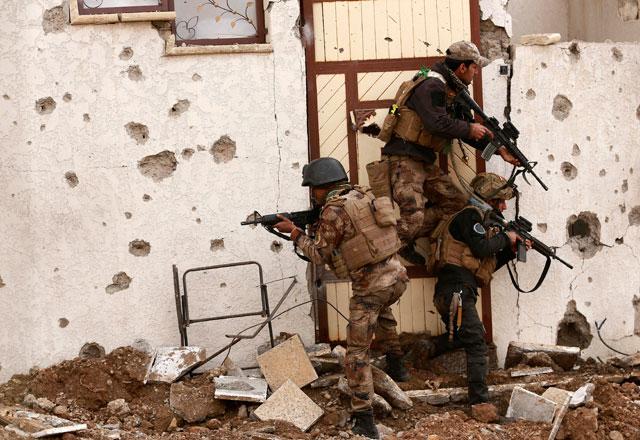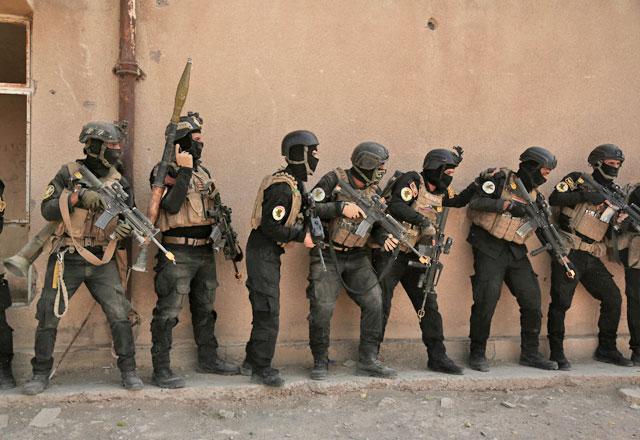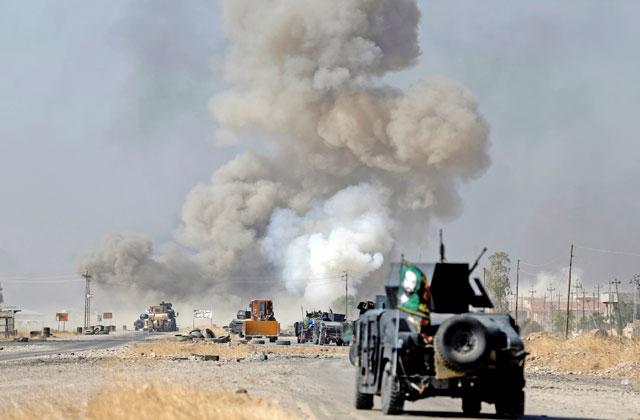You are here
Iraqi forces make first push into Mosul
By Reuters - Oct 31,2016 - Last updated at Oct 31,2016
EAST OF MOSUL, Iraq — Advancing Iraq troops broke through Daesh defence lines in an eastern suburb of Mosul on Monday, taking the battle for the insurgents' stronghold into the city limits for the first time, a force commander said.
They made the gain as the US-backed offensive to recapture Mosul — the largest military operation in Iraq since the invasion that toppled Saddam Hussein in 2003 — after two weeks of fighting to clear surrounding areas of insurgents.
Commanders had warned earlier that the battle for the city, the hardline militants' de facto capital in Iraq, could take weeks and possibly months.
Troops of the Iraqi army's Counter-Terrorism Service (CTS) moved forward on Gogjali, an industrial zone on the eastern outskirts. They then reached Karama district, their first advance into the city itself, an officer said.
"They have entered Mosul," he said. "They are fighting now in Hay [district] Al Karama."
A Reuters correspondent in the village of Bazwaia saw plumes of smoke rising from a built-up area a few kilometres away which a commander said was the result of the clashes in Karama.
A Kurdish peshmerga intelligence source said he received a report saying seven Daesh militants were killed in the Aden district, adjacent to Karama, and two of their vehicles destroyed. Iraqi state television said there were clashes inside the city between residents and Daesh extremists.
The fighting ahead is likely to be more difficult as civilians still live there, unlike most villages taken so far by the Iraqi forces which were emptied of their Christian population.
Daesh singled out religious minorities in northern Iraq, including Christians and Yazidis, for killing and eviction after leader Abu Bakr Al Baghdadi declared a "caliphate" in 2014 over territory they captured there and in neighbouring Syria.
Prime Minister Haider Al Abadi, speaking at the Qayyara military airbase south of Mosul, said the Iraqi forces were trying to close off all escape routes for the several thousand Daesh militants inside Mosul.
"God willing, we will chop off the snake's head," Abadi, wearing military fatigues, told state television. "They have no escape, they either die or surrender".
The recapture of Mosul would mark the militants' effective defeat in the Iraqi half of the territory they had seized.
Mosul is still home to 1.5 million residents, making it four of five times bigger than any other city they controlled in both Iraq and Syria.
Hadi Al Amiri, leader of the Badr Organisation, the largest Shiite militia fighting with Iraqi government forces, warned on Sunday that “the battle of Mosul will not be a picnic” and could last months.
On Monday, he expressed hope that Mosul would not descend into a protracted and devastating conflict like the four-year-old battle in the Syrian city of Aleppo, where Shiite militias are also fighting.
“We are afraid that Mosul would be another Aleppo, but we hope that will not happen,” Amiri told reporters in Zarqa, south of Mosul.
Iraqi security forces and peshmerga fighters started the offensive against the hardline Sunni group on October 17, with air and ground support from a US-led coalition.
Pro-Iranian Iraqi Shiite militias joined the fighting on Saturday, aiming to cut the route between Mosul and Raqqa, Daesh’s main stronghold in Syria.
Daesh militants has been fighting off the offensive with suicide car bombs, snipers and mortar fire.
Daesh said on Monday it carried out a suicide operation against a joint convoy of the army and Shiite militias south of Mosul. It gave no casualty figures.
The militants have also set oil wells on fire to cover their movements and displaced thousands of civilians from villages towards Mosul, using them as “human shields”, UN officials and villagers have said.
“Scorched earth tactics employed by retreating ISIL [Daesh] members are having an immediate health impact on civilians, and risk long-term environmental and health consequences,” the UN’s Office for the Coordination of Humanitarian Affairs said.
UN forecasts see up to 1 million people being uprooted by the fighting, which UN aid agencies said had so far forced about 17,500 people to flee — a figure that excludes those taken into Mosul by the retreating militants.
The warring parties have given no casualty figure so far in their ranks or among civilians. Both say they have killed hundreds of their opponents.
The involvement of the Shiite militias collectively known as Hashid Shaabi, or Popular Mobilisation forces, in the mostly Sunni region around Mosul has been a cause of concern for local officials. But they have not been linked to any sectarian incidents so far.
Related Articles
BAGHDAD — Iraqi Shiite forces fighting the Daesh terror group west of Mosul aim to clear a large strip of land on the border with Syria to p
BAGHDAD — An unlikely array of forces is converging on the city of Mosul, lining up for a battle on the historic plains of northern Iraq tha
EAST AND NORTH OF MOSUL, Iraq — The offensive to seize back Mosul from the Daesh terror group is going faster than planned, Iraq's prime min














